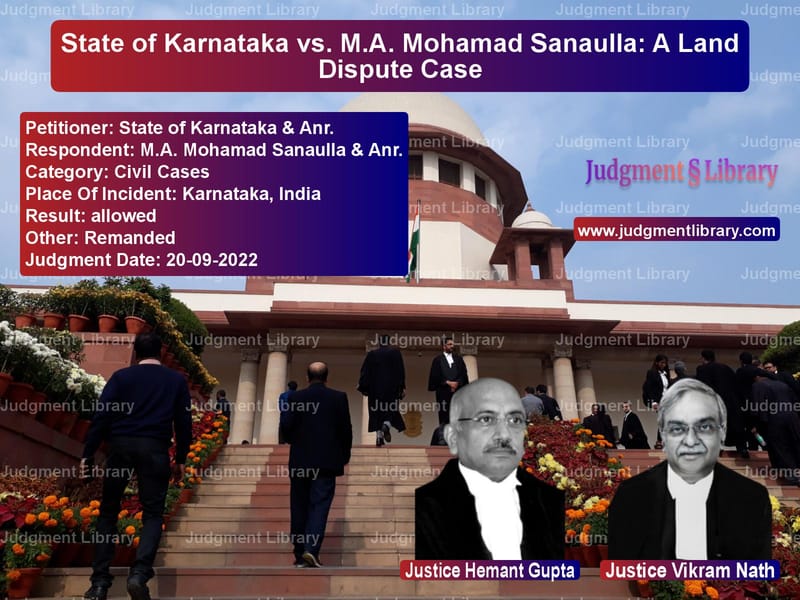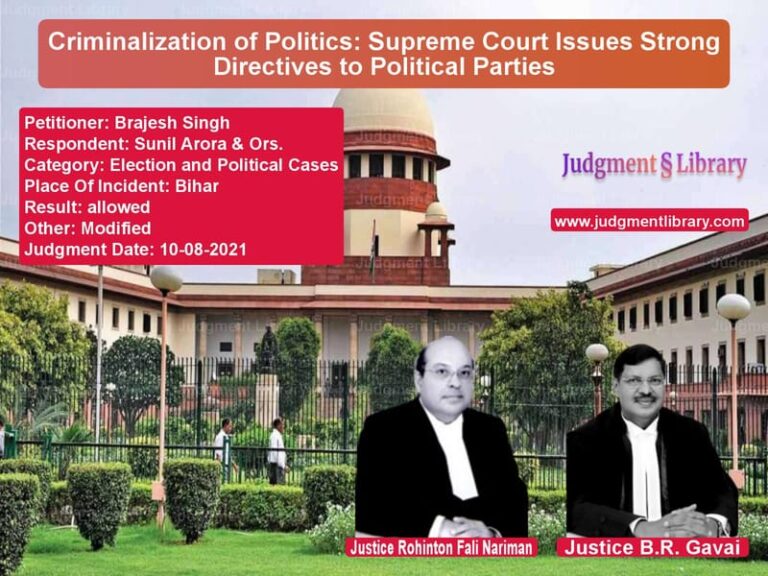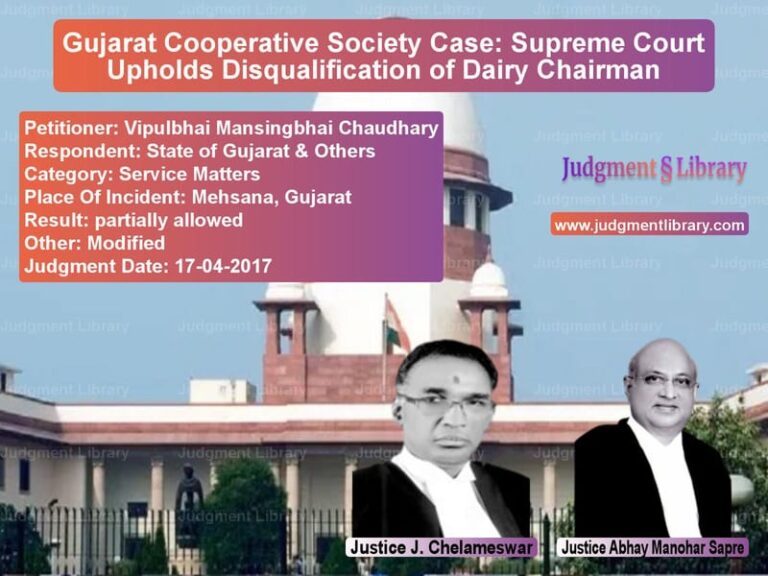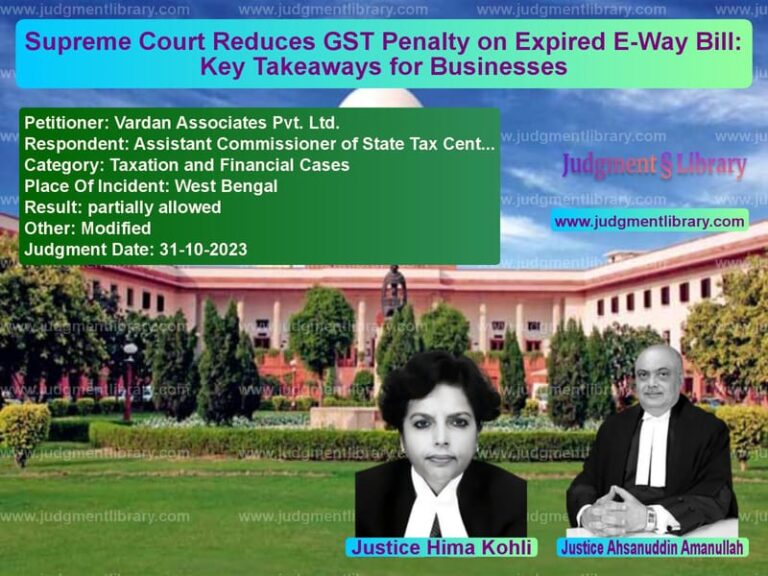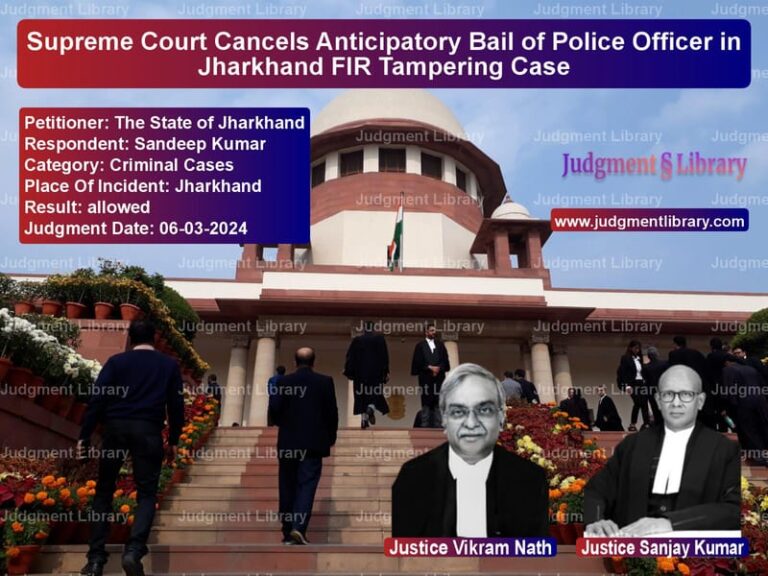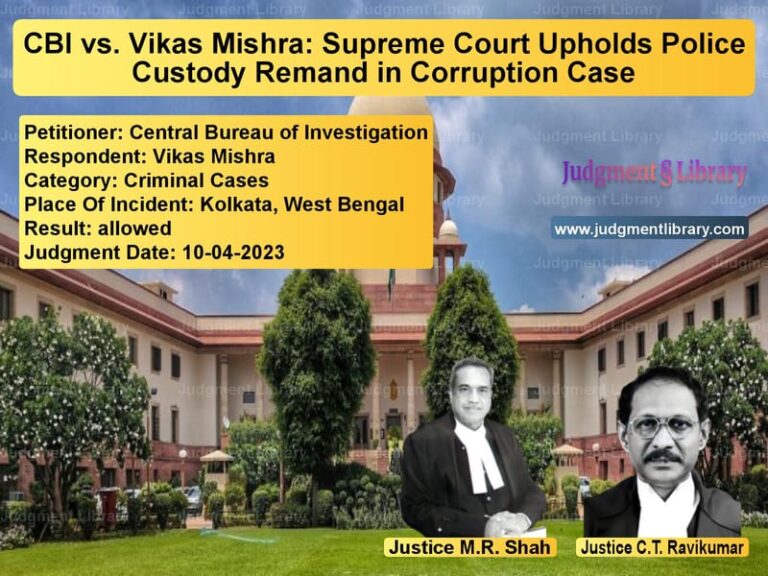State of Karnataka vs. M.A. Mohamad Sanaulla: A Land Dispute Case
The case of State of Karnataka vs. M.A. Mohamad Sanaulla revolves around a long-standing land dispute between the State and the respondent, which has been contested in various courts. The dispute concerns land in the village of Chikkasanne within the Bhuvanahalli State Forest area, and the case involves issues of land ownership, the status of the land as forest land, and the legality of transactions involving the land in question. This case has traversed multiple judicial forums, and the Supreme Court has now weighed in to resolve the matter, offering an insightful analysis on several legal principles related to land law, the authority of revenue departments, and the rights of individuals in relation to state-controlled land.
Background of the Dispute
The respondent, M.A. Mohamad Sanaulla, purchased a portion of land in Survey No. 69, which was initially part of a larger area designated as state forest under the Mysore Forest Regulation Act of 1921. The land, originally part of Survey Nos. 66, 67, and 68, was declared as forest land in the 1921 notification. However, the respondent’s plot, measuring 8 acres and 35 guntas, was purchased from a court auction in 1936 by an auction purchaser, who later transferred it to the respondent through a sale deed in 1977. Despite a subsequent claim by the State of Karnataka that the land was part of the forest reserve, the respondent maintained that his ownership rights were valid, especially after the sale and transfer through the auction.
In 1981, the respondent initiated legal proceedings to prevent interference with his possession, and the courts at that time ruled in his favor, granting him a permanent injunction against the State’s interference. However, the State’s case that the land was forest land persisted, leading to further legal actions.
The Legal Journey: Trial Court and High Court Decisions
The State filed a suit in 1997, which was transferred to the Fast Track Court, Devanhalli, in 2006. The suit sought a declaration that the respondent had no rights over the land, as it was deemed part of the Bhuvanahalli Forest Block. Despite various hearings, the trial court dismissed the suit in 2012. The High Court of Karnataka, upon hearing an appeal from the State, also dismissed the appeal in 2021, which included a cost penalty of Rs. 1 lakh against the State and some adverse remarks against the State’s legal representatives.
The State’s contention that the land was part of the forest area and that the auction sale of 1936 was invalid due to the forest land designation was rejected. The High Court ruled that the respondent had a right to the land, and the State’s challenge to the ownership was not valid.
Read also: https://judgmentlibrary.com/court-orders-coercive-action-against-husband-in-pending-us-case/
Supreme Court’s Review and Judgment
The State of Karnataka appealed the High Court’s decision to the Supreme Court, raising several important legal issues, including the denial of a proper opportunity to present evidence and the exclusion of certain critical documents. The Supreme Court, after hearing detailed arguments from both sides, determined that the lower courts had failed to provide adequate opportunities to the State to present its case, especially with respect to important evidence like the joint survey conducted in 2015.
The Court observed that the absence of the key witness, the Range Forest Officer (PW1), during the trial was significant, as it had impacted the ability of the State to prove that the land was indeed part of the forest reserve. Furthermore, the High Court’s rejection of the State’s application to admit the survey report conducted during the pendency of the first appeal was found to be an error. The survey report was deemed relevant for the case, and the Court held that the respondent should have the opportunity to rebut the findings of the survey.
The Court also examined the history of the land’s classification and the subsequent changes in its survey number, pointing out that the resurvey of Survey No. 67 as Survey No. 69 had not been adequately considered by the lower courts. The Court emphasized that the issue of the land’s forest status, especially after the resurvey, was crucial and needed further judicial scrutiny.
Read also: https://judgmentlibrary.com/supreme-court-upholds-agreement-to-sell-in-property-dispute/
Key Legal Arguments
State’s Argument: The State argued that the land in question was designated as forest land under the 1921 notification, and that subsequent sales of the land were illegal. The State pointed out that the 1936 auction, which transferred the land to the respondent’s predecessor, was invalid because it concerned land that was already part of the forest reserve. The State also contended that the trial court had acted too hastily in dismissing the suit and that the High Court had erred in rejecting critical evidence, including the 2015 joint survey.
Respondent’s Argument: The respondent, on the other hand, maintained that the land in question had been lawfully purchased through an auction sale, and that all legal formalities had been followed. The respondent argued that the sale deed from 1977 was valid, and the fact that the land had been partitioned into sub-plots further proved that it was not part of the forest reserve. The respondent also pointed out that the State had failed to challenge the auction or sale proceedings in a timely manner, and that the subsequent claim to the land was unjustified.
Supreme Court’s Ruling
The Supreme Court found merit in the State’s arguments, particularly regarding the failure to consider critical documents and evidence. The Court noted that the Trial Court had acted prematurely by not providing the State with a proper opportunity to present its case, especially after the key witness failed to appear for cross-examination. The Court also emphasized that the 1936 auction sale, which had transferred the land to the respondent’s predecessor, could not be valid if the land was indeed part of the forest reserve. The Court directed that the matter be remanded to the Trial Court for fresh determination, with adequate opportunity for both parties to present new evidence.
Conclusion
In light of the above, the Supreme Court remanded the case to the Trial Court, instructing it to reconsider the matter with all relevant evidence, including the survey report from 2015. The Court emphasized that the issue of forest land status should be examined carefully, and both parties should be given a fair chance to present their cases. The Court also directed the Trial Court to expedite the proceedings and make a decision within one year.
Judgment Date: September 20, 2022
Judges: Hemant Gupta, Vikram Nath
Petitioner Name: State of Karnataka & Anr.
Respondent Name: M.A. Mohamad Sanaulla & Anr.
Case Outcome: Appeal Allowed, Matter Remanded
Place of Incident: Karnataka, India
Original File Name: 24292_2021_15_1502_38400_Judgement_20-Sep-2022.pdf
Total Characters in File: 35298
Petitioner Name: State of Karnataka & Anr..Respondent Name: M.A. Mohamad Sanaulla & Anr..Judgment By: Justice Hemant Gupta, Justice Vikram Nath.Place Of Incident: Karnataka, India.Judgment Date: 20-09-2022.
Don’t miss out on the full details! Download the complete judgment in PDF format below and gain valuable insights instantly!
Download Judgment: state-of-karnataka-&-vs-m.a.-mohamad-sanaull-supreme-court-of-india-judgment-dated-20-09-2022.pdf
Directly Download Judgment: Directly download this Judgment
See all petitions in Contract Disputes
See all petitions in Property Disputes
See all petitions in Consumer Rights
See all petitions in Judgment by Hemant Gupta
See all petitions in Judgment by Vikram Nath
See all petitions in allowed
See all petitions in Remanded
See all petitions in supreme court of India judgments September 2022
See all petitions in 2022 judgments
See all posts in Civil Cases Category
See all allowed petitions in Civil Cases Category
See all Dismissed petitions in Civil Cases Category
See all partially allowed petitions in Civil Cases Category

